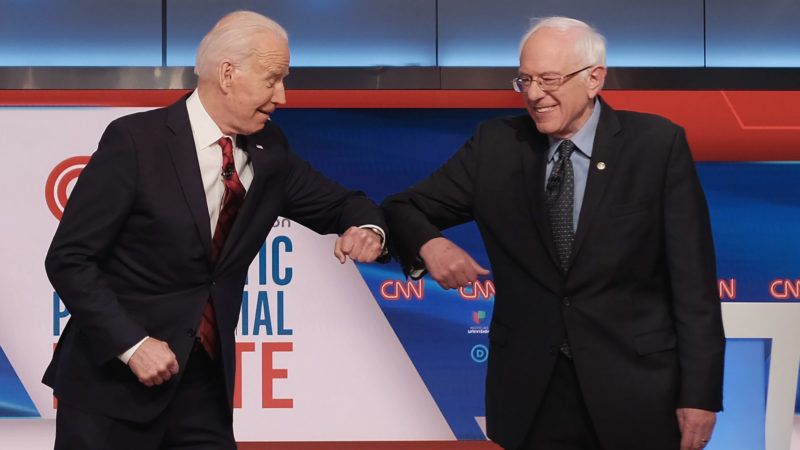Even In Defeat, Bernie Sanders Is Pulling Joe Biden to the Left
An expansive new batch of policy proposals shows Biden moving toward a more expensive, more intrusive policy agenda.

For most of the Democratic primary elections, the race resembled a battle between Sens. Bernie Sanders and Joe Biden—or, at the very least, the ideas and ideals they represented. The geriatric duo made almost perfect foils for each other, one the amiable, moderate party fixture, respected (if not always loved) by Democratic elders, the other its constant, cantankerous left-wing critic and the choice of its young insurgents. They were avatars of the party's self-satisfied insider class and its disgruntled agitators, the odd couple of Democratic politics, and the spectrum between them encapsulated the entirety of the party's internal debate.
The contest between the two was real, as was at least some of the animosity between their two camps. But the party's internal tug-of-war, sometimes sees as a struggle in which one view of Democratic politics would definitively prevail at the expense of the other, obscured the ways in which the two were actually working toward a synthesis, in which Biden's moderate-seeming likability politics would serve as a vehicle for a policy agenda that was—if not exactly #FullBernie—far more progressive than ever before.
That was true during the race, in which Biden ran notably to the left of the party's 2016 nominee, Hillary Clinton, on a host of issues. And it has proven even more true since Sanders dropped out and Biden became the presumptive nominee, especially when it comes to major domestic policy issues.
For the last several months, representatives from the two camps have been negotiating a far-reaching set of policy recommendations jointly backed by the two camps. While Sanders wouldn't get everything he proposed during the campaign—no Medicare for All, no Green New Deal—it would, inevitably, mean that Biden, who had already won the primary, would be moving left.
The mere fact that the two sides had come together was a sign of Biden's leftward momentum, and, given Biden's stature, a symbol of the party's leftward drift. But yesterday, the working group released its proposals, in the form of the "Biden-Sanders Unity Task Force Recommendations," 110 pages covering a multitude of issues, including climate, health care, criminal justice, education, and more.
On nearly every issue, the document would move Biden toward Sanders, with what The New York Times describes as "broader and costlier plans than he has championed so far in his campaign," and more aggressive plans to mandate reductions in carbon emissions.
Among other things, the new document proposes creating a new zero-deductible Obamacare plan that would automatically enroll low-income people who otherwise lack coverage, expanding Medicare eligibility to people aged 60 and up, boosting Social Security benefits, creating an environmental justice fund, canceling up to $50,000 in student debt for people working in education, and adopting more restrictive trade policies closer to what Sanders supported during the campaign.
These are not just friendly overtures to a primary opponent. They are real policy concessions from a politician who was already running on the most progressive platform of any Democratic nominee in recent memory. It's far from a full-fledged victory for the Sanders wing of the party, but it suggests significant movement in their direction, as Sanders indicated in a statement. "Though the end result is not what I or my supporters would have written alone, the task forces have created a good policy blueprint that will move this country in a much-needed progressive direction," he said. And its very existence hints at more of the same should Biden win the presidency in November.
Historically, successful nominees have tended to play to their party's base during the primary, then tack toward the center as the general election nears. But Biden has done almost exactly the opposite, claiming the moderate label during the primary, and then moving leftward, towards Sanders, after winning.
Not only that, he's doing so from a position of relative political strength—riding high in the polls against Trump, and increasingly likely to flip the Senate to Democratic control if he wins. Democrats, polls show, are already broadly unified behind him. That Biden's leftward trajectory has become more pronounced even as his ultimate victory looks more likely suggests that Biden, as president, may be most responsive to pressure from the left flank of his own party.
Biden has always styled himself as a centrist politician whose goal was to find the most universally agreeable path by negotiating and compromising with his political opponents. Over the last year, this approach has landed him in some trouble with those on the left who believe that negotiating with Republicans is a fool's errand.
But as it turns out, in 2020, he isn't negotiating with the GOP. Instead, he's bargaining with the Democratic left, trying to find the center of his own party rather than the country at large. The real Biden is not a reflexive moderate so much as a finder of consensus, and it's clearer than ever that the consensus he's looking for now is one that exists almost entirely to his left.

Show Comments (86)